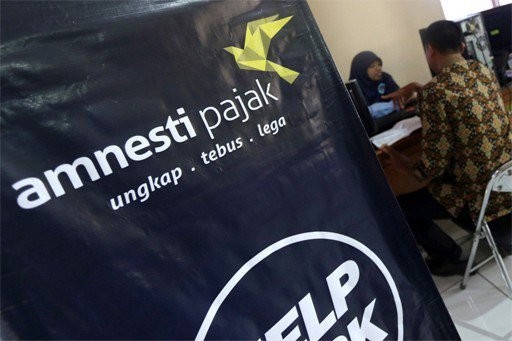Popular Reads
Top Results
Can't find what you're looking for?
View all search resultsPopular Reads
Top Results
Can't find what you're looking for?
View all search resultsNo sweet home for amnesty
Change text size
Gift Premium Articles
to Anyone
A
gainst the government’s expectations, the amount of funds repatriated under the tax amnesty remains low and experts point to the unappealing investment options onshore as the main culprit.
As of Tuesday evening, the repatriated funds only stood at Rp 143 trillion (US$11 billion), less than 15 percent of the Rp 1 quadrillion targeted. The figure has remained flat since early this month.
The government hopes the amount of repatriated funds will be high, as they are expected to help drive the sluggish domestic economy, which in 2015 expanded at its slowest pace in the past six years.
President Joko “Jokowi” Widodo has even appeared in a television commercial, urging wealthy Indonesians to help build the country. However, the government needs more than just nationalism to lure tax amnesty funds back into the country.
In the view of a Bahana TCW fund manager, big taxpayers are more comfortable investing in physical items that they can actually see, such as property.
Bahana TCW chief economist and investor relations director Budi Hikmat said during his visit to Singapore, he observed that wealthy Indonesians preferred to invest in property or to have their assets managed by family offices or conglomerates.
“[Talks on] mutual funds don’t resonate with them,” he said recently.
The Tax Amnesty Law allows repatriated assets to be invested onshore either in the financial or real sector through several investment mechanisms — such as government and corporate bonds, mutual funds, stocks, gold and property — for a minimum of three years.
The latest data from the Directorate General of Taxation shows that a majority of the repatriated funds came from cash and cash equivalents, reaching almost 70 percent.
Only 16 percent of the repatriated funds came from investment or securities, reflecting the reluctance of taxpayers to “let go” of their securities investments.
Moreover, participants of the first phase and the second phase — which will end in December — have until year-end to bring home the funds, resulting in the slow progress.
“It seems many of them don’t know where to invest yet,” Bahana TCW president director Edward P. Lubis said.
The lack of US dollar-denominated instruments hinders the repatriation as well, a fact acknowledged by bankers.
According to them, a major reason why few funds are being repatriated is because the country lacks attractive investment products in banks and the overall financial industry, particularly US dollar-based instruments.
HSBC Indonesia managing director and global markets head Ali Setiawan said the program should have been complemented by US dollar-based instruments since all of the incoming assets would be in US dollars.
There are only a few foreign currency-based instruments available to absorb the funds, namely regular US dollar time deposits in banks.
US dollar mutual funds and corporate bonds are exceedingly rare and they are “plain vanilla” compared to the investment instruments that taxpayers use overseas that have sophisticated structures and higher yields.
Ali said he doubted big taxpayers would be interested in directly investing in infrastructure projects, like those offered by the State-Owned Enterprises Ministry, because the government did not offer clear yield calculations to compensate this type of high-risk and long-term investment.
However, despite the slow progress, Finance Minister Sri Mulyani Indrawati is upbeat that the repatriated fund target is still feasible.
The government is currently revising eight regulations to further ease investors, including the facilitation of non-cash asset repatriation such as in a global bond.
The repatriation can be carried out in phases as well and the three-year lockup period will only begin after the assets enter the country’s financial system.
Investors will also be allowed to channel their investments as capital within a limited liability and the use of capital will be adjusted to a company’s own policy.
_________________________
To receive comprehensive and earlier access to The Jakarta Post print edition, please subscribe to our epaper through iOS' iTunes, Android's Google Play, Blackberry World or Microsoft's Windows Store. Subscription includes free daily editions of The Nation, The Star Malaysia, the Philippine Daily Inquirer and Asia News.
For print subscription, please contact our call center at (+6221) 5360014 or subscription@thejakartapost.com










